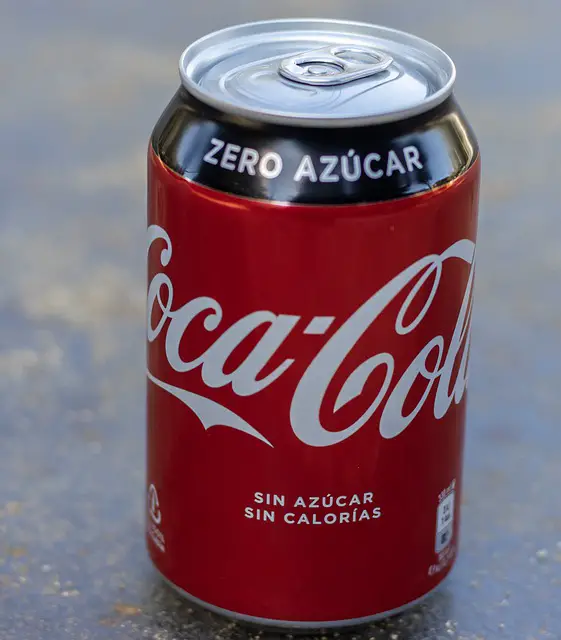Coke Zero is the flagship diet soda of Coca-Cola which debuted back in 2005 — many, many years after its progenitor, Tabb (eventually shortened to Tab) hit the market shelves in 1963.
It was later reformulated to taste even more like the standard Coca-Cola drink, and rebranded to emphasize more on its lack of sugar content, in 2017. The new name adopted for the Coke Zero rebrand was “Coca-Cola Zero Sugar” and that was met with initial backlash that eventually subsided.
On the ingredients list, Coca-Cola Zero Sugar claims to have zero content of sugar in it and contribute nothing in terms of calorific value to the overall body, while still offering the signature taste of standard Coca-Cola for its mainly manly audience to relish.
But that’s far from the only thing headed in bold. There’s caffeine too, and we’ll explore that in a second.
The original Coke Zero contains caffeine, but in reduced amounts compared to the diet coke. The use of caffeine is justified by The Coca-Cola Company as being a necessity.
It is stated clearly on their (now archived) website that the addition of caffeine to their drinks contributes to the overall flavor profile by adding a slight bit of bitterness and harmonizing well with other ingredients such as sugar and sweeteners to produce a sensation like no other.
How much caffeine is in Coke Zero?
The Coke Zero or Coca-Cola Zero Sugar contains a relatively lower percentage of caffeine content in comparison to many drinks out there, including its not-too-divergent sibling, the diet coke and also one of its other variations –the Coca-Cola Energy Zero Sugar line. I know right, pretty weird name!
To put things into clearer perspective,
One can (12oz or 355 ml) of Coke Zero offers about 32 mg of caffeine whereas a similar can of diet coke contains 42 mg.
In terms of a single fluid ounce, Coca-Cola Zero Sugar offers roughly 2.8 mg of caffeine for every fluid ounce of its products in this line.
In comparison, the caffeine content of your morning Joe — which should typically never go below the 150 ml mark, can range anywhere from 50 to 400 mg, which is clearly more than what is found in a can of Coke Zero, Coke, or Diet coke.
While Coca-Cola Zero Sugar and all its fruity variations contain that much of caffeine content in them, there is one rather obscure member of the family that packs a little more caffeine punch than the mix, and that’s the Coca-Cola Energy Zero plus all its fruity variations too.
This is understandable because the overall idea behind energy drinks is to stimulate brain function and increase concentration and alertness. And very few ingredients enhance those functions better than caffeine while also contributing positively to the unique flavor profile that The Coca-Cola Company is after.
A 12 fluid ounce serving of Coca-Cola Energy Zero Sugar contains 114mg of caffeine which is the same amount found in the variation with sugar.
In terms of a single fluid ounce, Coca-Cola Energy Zero Sugar offers roughly 9.5 mg of caffeine for every fluid ounce of its products in this line.
114 mg of caffeine content per 12 fluid ounces is a little over three times what you’ll find in Coke Zero or Diet Coke.
Having said that, the Coke Zero brand also offers a variety of the product (first introduced in 2010, in France) that does not contain caffeine at all. It is marketed as the “Caffeine Free Coca-Cola Zero Sugar” having nearly the same flavor as the original Coke Zero with a much lowered chance of getting you all jittery!
Here is a list of Coca-Cola products and the amount of caffeine in them.
| s/n | Coke products | Amount of caffeine in 12 oz can |
| 1 | Standard Coke | 34 mg |
| 2 | Coke Zero or Coca-Cola Zero (with all the fruity variations) | 34 mg |
| 3 | Coke Energy | 114 mg |
| 4 | Coke Energy Zero Sugar | 114 mg |
| 5 | Diet Coke | 42 mg |
| 6 | Caffeine free Coca-Cola Sugar | 0 mg |
| 7 | Caffeine Free Diet Coke | 0 mg |
Is caffeine even dangerous to begin with?
The amount of caffeine content in all Coca-Cola’s product are at a level safe for most healthy adults to consume.
And for all variations other than the energy drinks, it shouldn’t contribute significantly to the overall caffeine consumption of any individual in any given day, given moderate consumption.
The caffeine level in Coca-Cola is also safe for any pregnant woman or breast feeding mother to consume (under supervision and moderation of course).
When it comes to caffeine, like most other psychoactive ingredients, there’s often a safe limit to avoid crossing otherwise you risk facing a plethora of side effects especially when your system isn’t that tolerant of the ingredient by much.
400 mg per day is the non-established safe upper limit for most healthy adults, but striving for lesser or no caffeine content at all, as someone having a poor tolerance to the ingredient is more than emphasized.
Some people can take more caffeine that the non-established safe upper limit and still appear perfectly okay. Typically, these are individuals with a genetic makeup that is on the more tolerant side, or those that have developed tolerance through frequent consumption.
Other populations can develop a variety of side effects from consuming little caffeine or slightly more than the recommended limit. These are individuals that typically have genes on the intolerant side, or those that are already compromised with sicknesses such as anxiety, high blood pressure, diabetes or other medical conditions.
As far as the long term effects of caffeine is concerned (for healthy individuals), it seems to be tilted towards the positive end of the spectrum.
Caffeine has little evidence of harm, but rather many evidence of benefits. Caffeine is associated with longevity and also with the reduction of risk of various illnesses including:
- Type 2 diabetes
- Liver cancer
- Depression
- Parkinson’s disease.
In summary: Taking caffeine at or below recommended intake is not associated with any healthy risk at all. Rather, you may benefit from the practice by having a healthier life. With that said, some populations that are compromised with disease that cause intolerance to caffeine should reduce and limit their intake to much safer levels or even avoid the tonic completely.
Is coke zero safe?
The fact that the list of ingredients for the Coke Zero looks kind of pristine doesn’t actually mean it is.
This specific brand from the beverage giants is actually far from keeping a clean sheet than you’re imagining.
While Coke Zero contains practically zero sugar, an ingredient which we know can be very detrimental when abused, it may contain something equally detrimental if not more, and that’s the artificial sweeteners used in place of sugar.
These work the magic of creating a calorie free product, but on the other hand, some studies have shown their association with an increased risk of type 2 diabetes by the same proportion as any sugar-sweetened drink. Artificial sweeteners have also be linked with obesity and several diseases including, bone, heart and kidney diseases.
Having said that, it’s also important to note that there are several conflicting studies to those that link artificial sweeteners to diseases. These label the effects of artificial sweeteners as either neutral or beneficial to weight management.
The fact that conflicting studies exist means that Coke Zero is still in the grey area, and many studies are required to establish it’s title as the king of diet beverages, or send it packing into murky trash cans across the globe.
What Coca-Cola products don’t contain caffeine?
According to the Coca-Cola Britain website, the following products do not contain caffeine in them.
- Fanta
- Sprite
- Caffeine Free Diet coke
- Oasis
- Lilt
- 5 Alive
Final Thoughts
Coke zero is marketed under a rainbow of variations, and while the original Coke Zero drink and its exactly half a dozen fruit variations have about 34 mg of caffeine per 12 fluid ounce, the Coca-Cola energy line has a little over 3 times more caffeine content at 114 mg than the original Coke zero.
If you’re looking for a caffeine free variation of the coke zero, the company claims to offer one marketed as “Caffeine Free Coca-Cola Zero Sugar”.
It contains zero amount of caffeine while nearly preserving the relish of the standard Coca-Cola drink.


